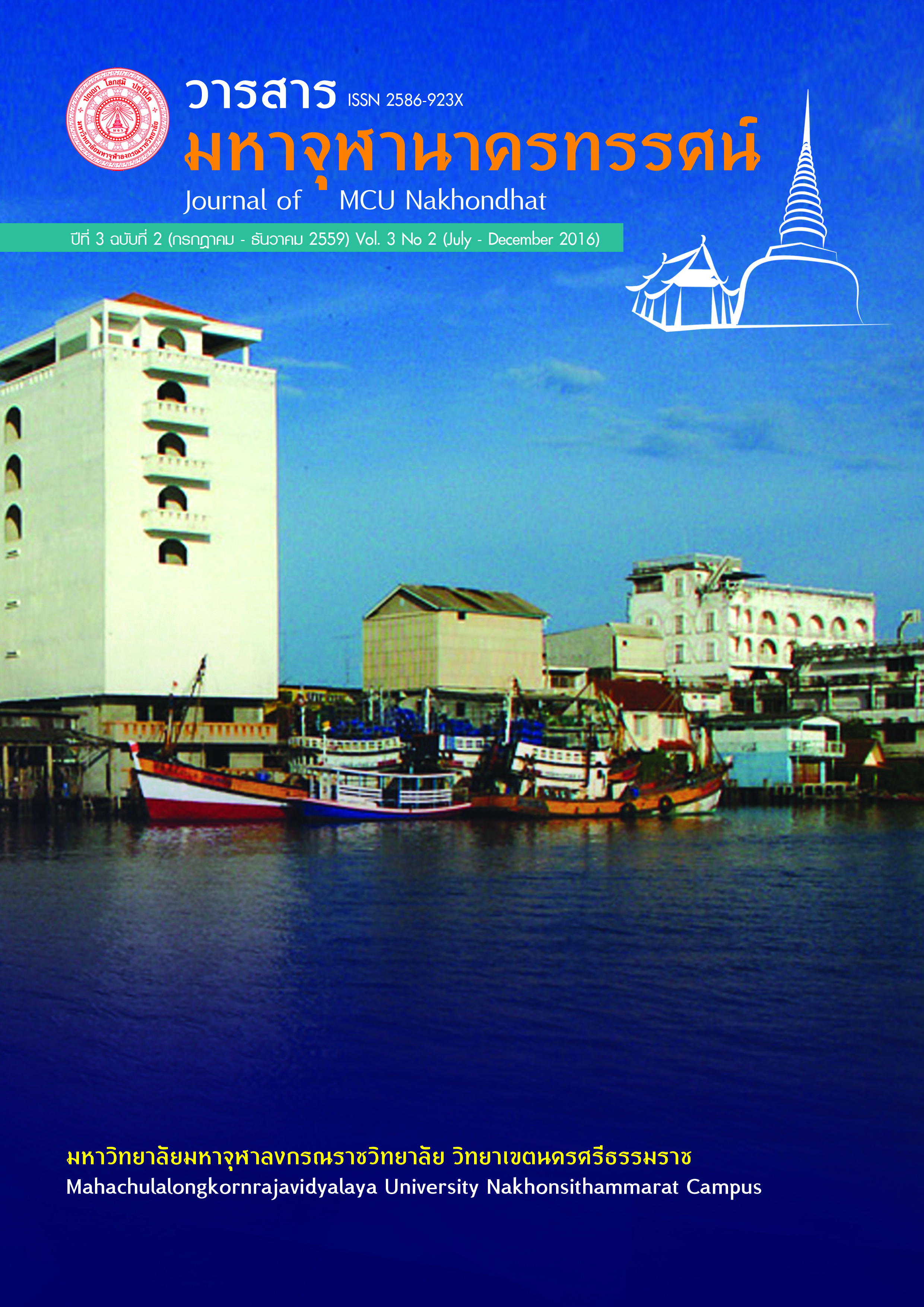AN APPLICATION OF THE THREE FOLD TRAINING PRINCIPLES IN DAILY LIFE OF PEOPLE IN MAI RIANG SUB- DISTRICT MUNICIPALITY, CHAWANG DISTRICT, NAKHON SITHAMMARAT PROVINCE.
Main Article Content
Abstract
The objectives of this research were as follows; 1. to study an application of the three fold training principles in daily life of people in Mai Riang sub-district municipality, Chawang district, Nakhon Si Thammarat province, 2. to compare an application of the three fold training principles in daily life of people in Mai Riang sub-district municipality, Chawang district, Nakhon Si Thammarat province in terms of sexes, ages, degrees of education, occupations, and monthly incomes as differently, and 3. to study the suggestions were concerned with problems and the way to promote the three fold training principles in daily life of people in Mai Riang sub-district municipality, Chawang district, Nakhon Si Thammarat province. This research is quantitative research and the samples for this research were people who live in Mai Riang sub-district municipality, Chawang district, Nakhon Si Thammarat province, there are about 335 persons. The instrument for data collection was questionnaire, designed by researcher, the reliability at 0.952, data analysis by package computer program in social science. The statistics were applied as follows; frequency, percentage, arithmetic mean, standard deviation, Z-test, One Way ANOVA (F-test) and LSD method (Least Significant Difference).
The findings were as follows:-
- The people who live in Mai Riang sub-district municipality, Chawang district, Nakhon Si Thammarat province had applied in the three fold training principles in daily life by overview was at more level, when considered in each aspects found that the aspect of JittaSikhã(Smadhi) was the highest mean, and fallowed up the aspect of PaññaSikhã(Paññã) and the aspect of SilaSikhã(Sila) was the lowest mean.
- The comparative results on the three fold training principles in daily life of people in Mai Riang sub-district municipality, Chawang district, Nakhon Si Thammarat province found that in terms of sexes, ages, degrees of education, and monthly incomes there were different as statistically significance at 0.001, but in terms of occupations there were not different as statistically significance at .05.
- The suggestions were concerned with problems and the way to promote on the three fold training principles in daily life of people in Mai Riang sub-district municipality, Chawang district, Nakhon Si Thammarat province, almost they recommended in the aspect of SilaSikhã (Sila) i.e. lack of behavior principles for benefit to themselves and surrounding, and peaceful living in society, lack of honesty, be selfish, to conduct Sila was so difficult, they were misconduct on PanjaSila as selfless, the way to promote they almost recommended in the aspect of SilaSikhã(Sila), i.e. there should promote people for doing the benefit for themselves and surrounding and to live with peacefulness in society, there should promote people for the right consciousness, there should promote people to do merit and practice Dhamma in temple, and there should promote people to conduct on PanjaSila as strictly.
Article Details
References
พระพรหมคุณาภรณ์ (ป.อ. ปยุตฺโต). (2552). พุทธธรรม.พิมพ์ครั้งที่ 17. กรุงเทพมหานคร: โรงพิมพ์มหาจุฬาลงกรณราชวิทยาลัย.
ระวี ภาวิไล. (2528). หัวใจศาสนา. กรุงเทพมหานคร: โรงพิมพ์มหาจุฬาลงกรณราชวิทยาลัย.


